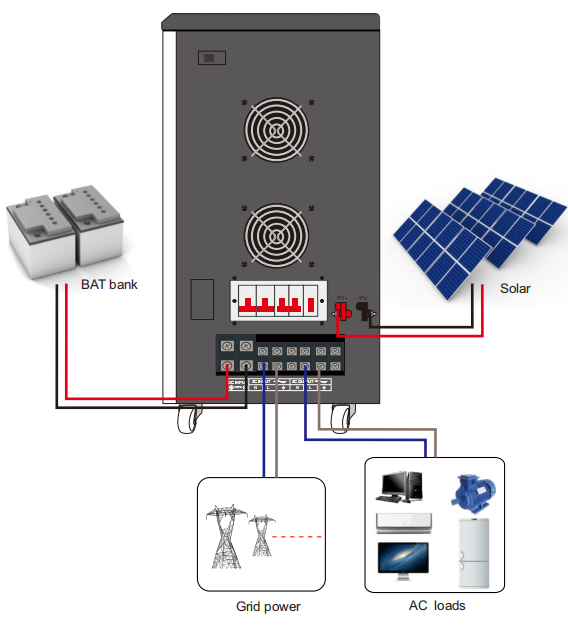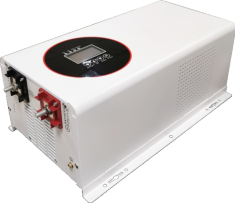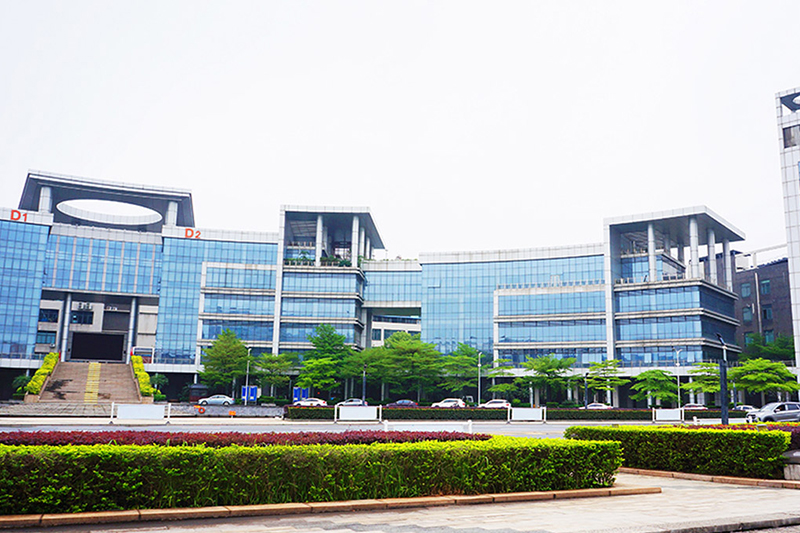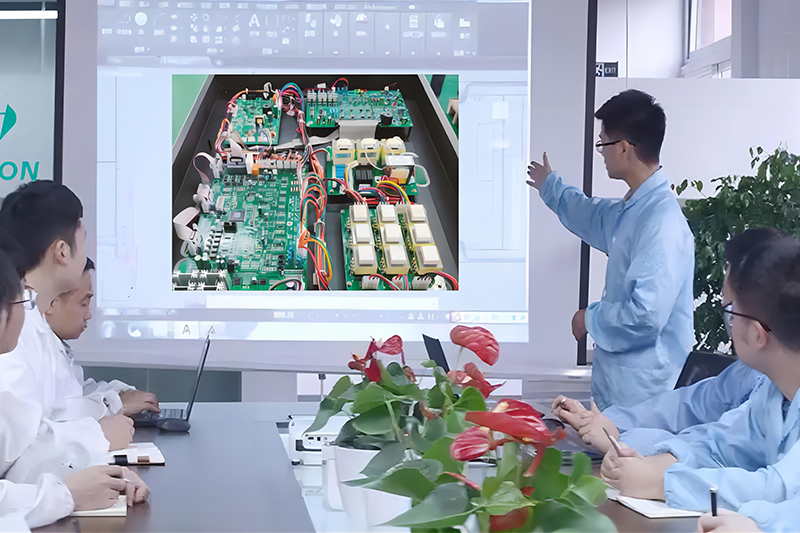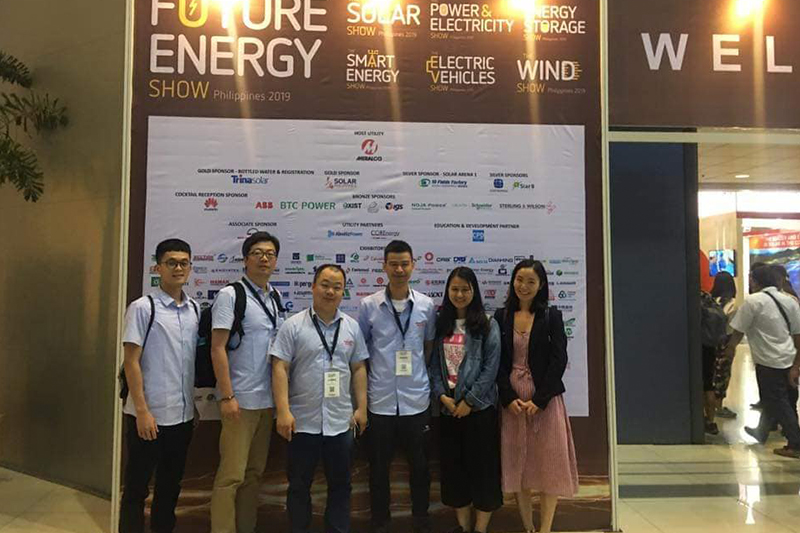GT 8KW IGBT Solar Inverter
Brand: Lersion
Product origin: China
Delivery time: 7-15 days
Supply capacity: 100000
1 Germany Infineon IGBT module;
2 America new generation GSP chip technology;
3 50 engineers R&D teams,self design and innovation circuit,system;
4 plus 12years factory manufacturer experience,customer feedback improvement
*high end * more safe * more stable *long lifespan
GT Series 8KW Solar Inverter/ Hybrid Off Grid Inverter
1 GT Series 8KW Product Features
The inverter adopts MCU microprocessor fully digital SPWM control technology, with pure sine wave output;
Unique dynamic Current loop control technology;
Super strong load-bearing capacity, capable of adapting to capacitive, resistive, inductive, and mixed loads;
Strong overload and impact resistance, able to withstand full load startup;
Input overvoltage/undervoltage, output overvoltage/undervoltage, over temperature, overload, and short circuit protection functions;
High efficiency, low noise, environmental protection and energy conservation;
Automatic switching, enabling unmanned operation;
Stable performance, safe and reliable, with an ultra long service life;
Communication: USB/SNMP/GSM SMS;
WIFI remote monitoring(optional)
2 GT Series 8KWApplication
 |  |  |  |  |  |
| Residential | Hotel Villa | Ship/island | Farm | No electricity eara | Factory |
3 GT Series 8KW Application Diagram
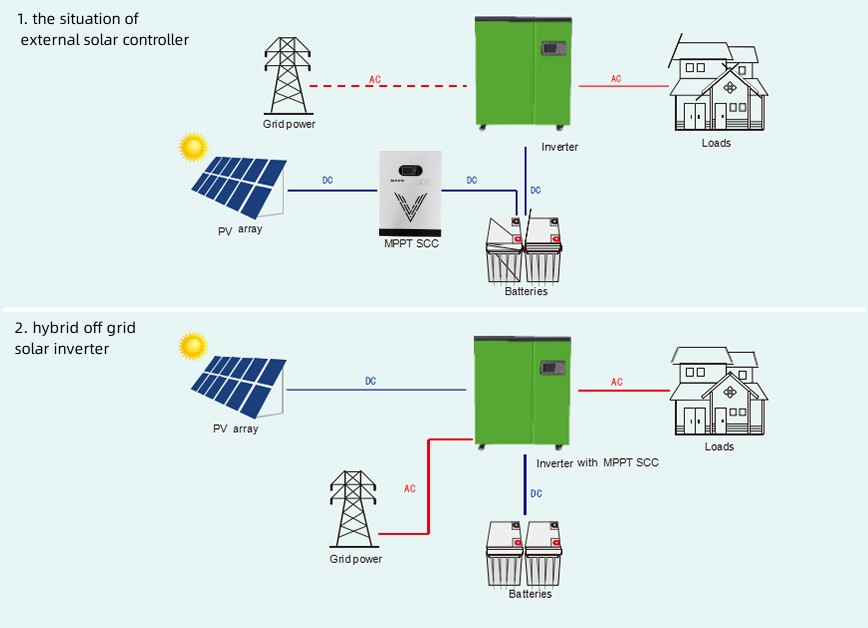
4 GT Series 8KWTechnical Parameters
| Inverter mode | GT080 | GT100 | GT120 | GT150 | GT180 | GT200 | GT250 | GT300 |
| Hybrid off grid inverter mode | GTM080 | GTM100 | GTM120 | GTM150 | GTM180 | GTM200 | ||
| Rated power | 8KVA | 10KVA | 12KVA | 15KVA | 18KVA | 20KVA | 25KVA | 30KVA |
| Battery voltage | 96V/192V | 192V/240V/360V | 240V/360V | |||||
| Size:(L*W*Hmm) | 580*370*730 | 740*400*930 | ||||||
| package size (L*W*Hmm) | 650*420*840 | 820*480*1050 | ||||||
| N.W.(KG) | 78 | 85 | 92 | 116 | 130 | 133 | 150 | 169 |
| G.W.(KG) | 90 | 97 | 104 | 132 | 146 | 149 | 166 | 185 |
| Input | ||||||||
| Phase | L+N+G | |||||||
| AC input range | 110V:85-138VAC;220V:170-275VAC | |||||||
| Input frequency | 45Hz~65Hz | |||||||
| Output | ||||||||
| Output voltage | inverter mode:110VAC/220V±5%;AC mode:110VAC/220VAC±10%; | |||||||
| Frequency range (AC mode) | Automatic tracking | |||||||
| Frequency range (inverter mode) | 50Hz/60Hz±1% | |||||||
| Over load capacity | AC mode:(100%~110%:10min;110%~130%:1min;>130%:1s;) | |||||||
| inverter mode:(100%~110%:30s;110%~130%:10s;>130%:1s;) | ||||||||
| Peak current ratio | 3:1max | |||||||
| Conversion time | <10ms(Typical loads) | |||||||
| Waveform | Pure sine wave | |||||||
| Efficiency | >95%(80% resistive loads) | |||||||
| Protection functions | Battery overvoltage protection,battery undervoltage protection,overload protection, short circuit protection,overtemperature protection,etc. | |||||||
| built in solar charge controller(adjust) | ||||||||
| Max charge current | 50A | 60A | 100A | 120A | ||||
| Battery voltage | 96V/192V | 96V/192V | 96V/192V | 96V/192V | ||||
| PV input voltage range | 96V:145V-230V;192V:260V-400V; | |||||||
| Max PV input | 96V:4800W 192V:9600W | 96V:5760W 192V:11520W | 96V:9600W 192V:19200W | 96V:11520W 192V:23040W | ||||
| Cooling method | Fans cooling | |||||||
| environmental conditions | ||||||||
| Operating temperature | 0℃-40℃ (Battery life decreases at ambient temperatures above 25 degrees Celsius) | |||||||
| Operation humidity | <95%(without condesing) | |||||||
| Operating altitude | <1000m(with increase of 100m,it will reduce output of 1%) max5000m | |||||||
| Noise | <58dB(distance to machine 1m) | |||||||
| Management | ||||||||
| Display | LCD+LED | |||||||
| Computer communication interface | RS232(adjust) | |||||||
| *The above data is for reference. If there is any change, please refer to the real object. | ||||||||
5 LED Color Touch Screen
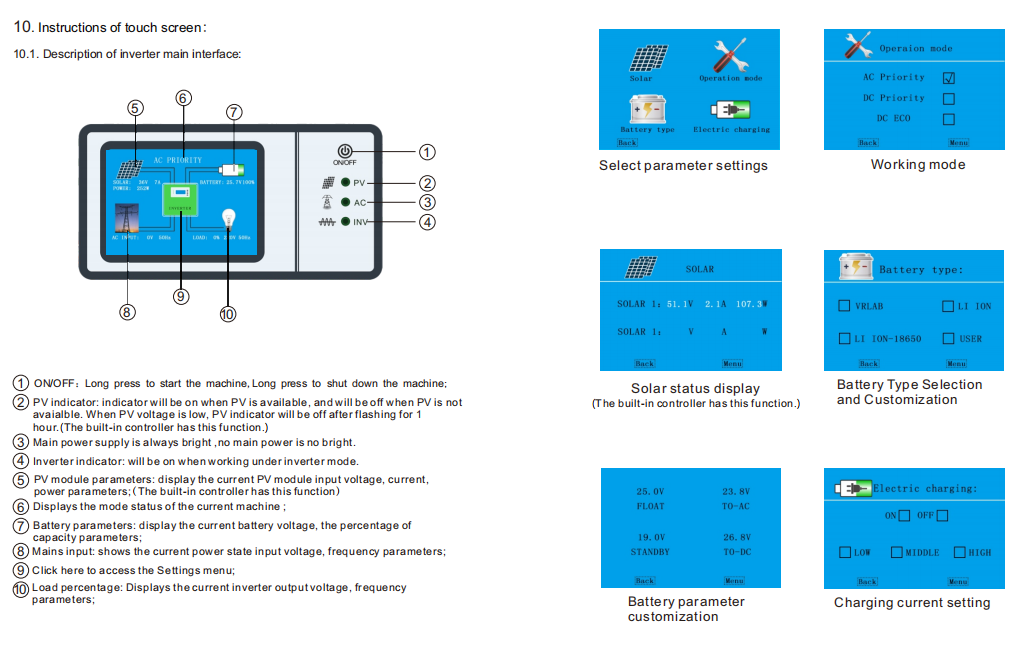
6 Working Mode
Mains Priority Mode (UPS)
Step 1: When there is mains power, it is directly output by the mains bypass and simultaneously charges the battery;
Step 2: When there is a sudden power outage or abnormality in the mains, the system automatically switches to battery inverter power supply within 5ms to ensure continuous operation of the load:
Step 3: When the mains power is restored, the system automatically switches to mains power supply and charges the battery at the same time; Explanation: If a photovoltaic panel is connected, under normal photovoltaic power generation, the battery will also be charged until it is fully charged,
Battery priority mode (photovoltaic priority)
Step 1: When the battery voltage is normal, the inverter power will be supplied by the battery (battery+photovoltaic) inverter output. Explanation: When the photovoltaic power generation power is greater than the electricity consumption power, the photovoltaic power will be directly inverter output for the load to use, and the excess electricity will be stored in the battery; If the photovoltaic power generation does not meet the electricity demand, the system will use batteries to supplement some of the electricity to meet the electricity demand
Step 2: When the battery is under voltage, the inverter power supply will automatically switch to the mains bypass output power supply, but the mains will not charge the battery; Explanation: Under voltage of the battery indicates that the photovoltaic power generation is not sufficient for use. This function mainly achieves complementary charging of urban electricity and ensures continuous use of electrical equipment. At this time, the battery needs to be charged by solar energy.
Step 3: When the photovoltaic panel or mains power is charged to the set value through the inverter power supply, the inverter power supply will automatically switch to the battery inverter output, achieving priority use of photovoltaic power generation.
Step 4: When there is a power failure, insufficient photovoltaic power generation, and insufficient battery voltage, the inverter will automatically turn off the output and enter sleep mode. Explanation: If the power supply returns to normal at this time, the inverter power supply will automatically turn on and switch to the power supply bypass output; If the mains power does not return to normal, it is necessary to wait until the photovoltaic system charges the battery to the set voltage, and the inverter will automatically turn on and resume the inverter output (this function is an unmanned function).
Energy saving mode (ECO)
When the inverter power supply is in energy-saving mode, the idle consumption is around 3W-5W, and only the chip is working, the inverter power supply will automatically cycle to detect the load power of the electrical appliance. When the load power is greater than 30W, the system will automatically start up and enter normal working mode within 5S to supply power to the load; When the load is unloaded (less than 30W), it automatically enters the energy-saving state within 5s; This feature greatly reduces unnecessary power waste in the system and minimizes idle consumption as much as possible.
Unattended
When the battery capacity is insufficient and the battery is under voltage, the inverter power supply will turn off its output and automatically enter a sleep state. The no-load loss is about 1W. When the photovoltaic system replenishes the battery voltage and returns to the set value, the inverter power supply will automatically turn on and resume output power supply. Description: This function is mainly applied to the use environment of pure off grid solar power generation without mains power and long-term unmanned operation, (such as video monitoring and photovoltaic water pumps)
7 GT Series 8KW Connection Diagram
